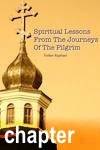 We learn the guarding of our heart, and the basics of the Jesus Prayer from Saint Nicephorus the Hermit from the Philokalia.
We learn the guarding of our heart, and the basics of the Jesus Prayer from Saint Nicephorus the Hermit from the Philokalia.
Dear beloved,
We will attempt to go through the Philokalia as the reposed starets taught the pilgrim in a dream. Let us go according to the instruction of the starets, by starting with the teaching of Saint Nicephorus the Hermit from Mount Athos, concerning sobriety and the guarding of the heart.
Saint Nicephorus first mentioned that finding eternal life by finding the Kingdom of God within us (Luke 17:21) is a science, and even more of an art. This means that in the Orthodox tradition, importance is given more to an experience from the heart, than simply rational and logical deductions through the mind more commonly associated with Western traditions. When we walk towards God, it is not merely a mechanistic deduction to knowing about God, and then finding scientific means to attaining spirituality. Rather, in the Orthodox tradition, we are looking at an experience, that of finding God’s love (2 Timothy 2:13), and returning as much love as we can summon, to God. When we love someone, we tend to desire to give as much as we possess to that person. And if we truly love someone unconditionally, we would desire to give as much as we possess to that person, without qualification, without hesitation, without caution (Proverbs 17:17).
Saint Nicephorus advised that we should first return to our inner selves, before we can attempt to be reconciled back with God. What does that mean? All too often, we seek external methods that are alien and unrealistic to our inner nature, and try to harshly “marry” those methods to our hearts desiring God. In the end, all we can find will be barren deserts lacking in any closeness to God and His dew of love. Imagine ourselves as a child, who has consistently neglected the home we have, the loving parents we have, and we go out often to look for company and fun (Luke 15:11-32). While those we meet outside may be fun sometimes, there will always be competition, lack of authenticity, and lack of emotional depth. Only when we drop our playfulness and return home to the arms of our loving parents, do we begin to find the true love, the comfort, the peace, and contentment. It is the same as seeking the Kingdom of God – that of returning to our inner selves.
Saint Nicephorus quoted Saint John of the Ladder, to equate our spirituality like a house, which is frequently besieged by thieves and robbers, for the treasure of the heart within. Saint John of the Ladder, as well as Saint Macarius the Great, advised us that we should guard our bodies, our tongues, and our hearts. When we are vigilant and constantly in prayer, especially calling on the name of Jesus Christ our Lord, we can detect and resist the attacks of the devil against our hearts (1 Peter 5:8). Saint Isaac of Syria also described that the ladder to the Kingdom of God is hidden within us, consistent with all the great fathers among the saints, who reminded us, time and again, to guard our hearts and manifested actions, like a treasure house worthy of protection and nurture.
Saint John of Karpathos added that when we pray, it should not be cavalier and occasional, but consistent, disciplined, much like how we would labor for our food and living at our jobs, because we are afraid to be unemployed. Likewise, would we not see our salvation as even more important than a mere job, and labor so much more for it?
Every second, our mind drifts through thoughts, which may drift off to nothingness, or be nurtured into actions. Saint Symeon the New Theologian reminded us that the devil would thwart our prayerful lives by injecting new distracting ideas into us, or to fester what our sinful nature already imagined (2 Corinthians 2:11). Saint Symeon said that the only way against the devil’s constant battles against our souls is to have a constant remembrance of God. In every breath, every step, every gesture, every word, every action, let us attempt to keep a remembrance of our God, so that all these visible actions may be transfigured into faith and love by the mercy of God.
Next, Saint Nicephorus taught us, beginners, how to pray the Jesus prayer.
He asked us to breath in, and draw the air with our mind, to enter our heart, and attempt to keep our mind within our heart, with the prayer “Lord Jesus Christ, Son of God, have mercy on me, a sinner”. Whenever the mind drifts away with thoughts, positive or negative, return it with the breath, into the heart. Breathe in and out naturally with the flow of the prayer within our heart. By praying silently, we are bringing the prayer into our hearts. It should not be a painful and fidgety experience, as we are NOT trying to restrain the mind, but to allow it to sense the joy of the Jesus Prayer resting and resonating with the heart (1 Thessalonians 5:16-18). In the beginning, it will be difficult, as much as I find it difficult to explain the exact feeling. But the more, and the longer you rest the Jesus Prayer frequently within your heart by drawing in your mind, the more peace you will find.
We will continue with the teachings of Saint Gregory of Sinai next, from the Philokalia concerning the inner prayer.
“Lord Jesus Christ, Son of God, have mercy on me, a sinner.”
